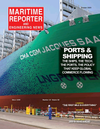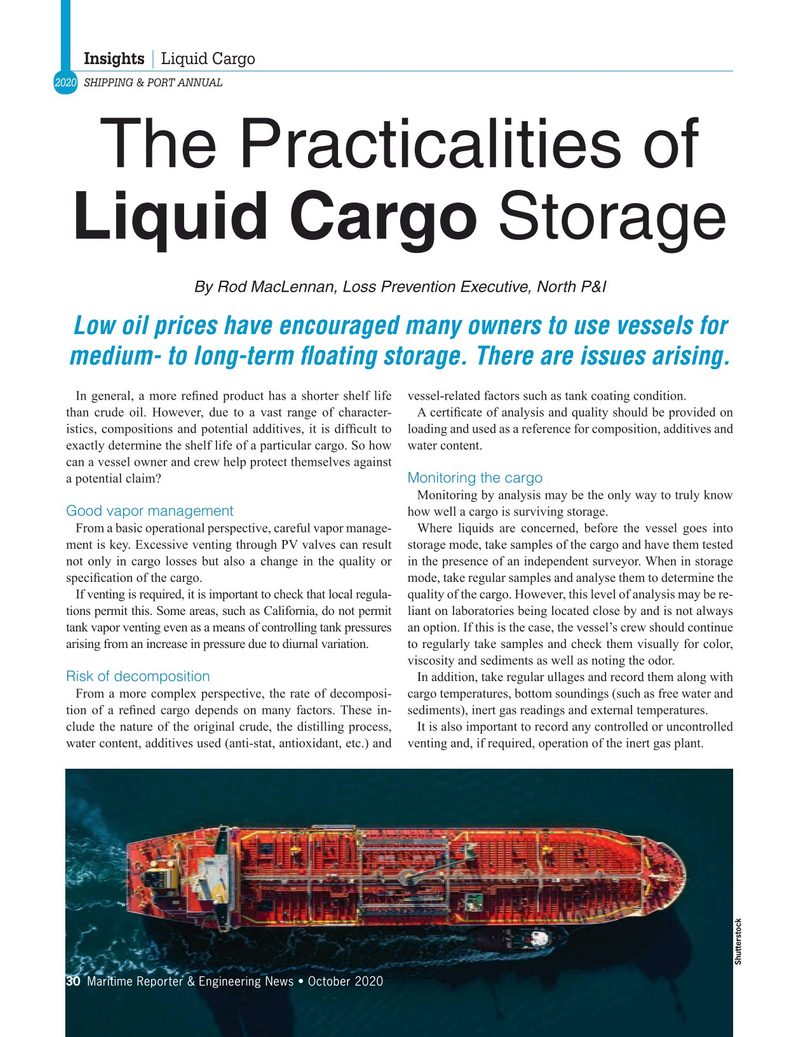
Page 30: of Maritime Reporter Magazine (October 2020)
Shipping & Port Annual
Read this page in Pdf, Flash or Html5 edition of October 2020 Maritime Reporter Magazine
Insights | Liquid Cargo 2020 SHIPPING & PORT ANNUAL
The Practicalities of
Liquid Cargo Storage
By Rod MacLennan, Loss Prevention Executive, North P&I
Low oil prices have encouraged many owners to use vessels for medium- to long-term ? oating storage. There are issues arising.
In general, a more re? ned product has a shorter shelf life vessel-related factors such as tank coating condition. than crude oil. However, due to a vast range of character- A certi? cate of analysis and quality should be provided on istics, compositions and potential additives, it is dif? cult to loading and used as a reference for composition, additives and exactly determine the shelf life of a particular cargo. So how water content.
can a vessel owner and crew help protect themselves against
Monitoring the cargo a potential claim?
Monitoring by analysis may be the only way to truly know
Good vapor management how well a cargo is surviving storage.
From a basic operational perspective, careful vapor manage- Where liquids are concerned, before the vessel goes into ment is key. Excessive venting through PV valves can result storage mode, take samples of the cargo and have them tested not only in cargo losses but also a change in the quality or in the presence of an independent surveyor. When in storage speci? cation of the cargo. mode, take regular samples and analyse them to determine the
If venting is required, it is important to check that local regula- quality of the cargo. However, this level of analysis may be re- tions permit this. Some areas, such as California, do not permit liant on laboratories being located close by and is not always tank vapor venting even as a means of controlling tank pressures an option. If this is the case, the vessel’s crew should continue arising from an increase in pressure due to diurnal variation. to regularly take samples and check them visually for color, viscosity and sediments as well as noting the odor.
Risk of decomposition In addition, take regular ullages and record them along with
From a more complex perspective, the rate of decomposi- cargo temperatures, bottom soundings (such as free water and tion of a re? ned cargo depends on many factors. These in- sediments), inert gas readings and external temperatures. clude the nature of the original crude, the distilling process, It is also important to record any controlled or uncontrolled water content, additives used (anti-stat, antioxidant, etc.) and venting and, if required, operation of the inert gas plant.
Shutterstock 30 Maritime Reporter & Engineering News • October 2020
MR #10 (18-33).indd 30 10/6/2020 8:52:14 AM

 29
29

 31
31
